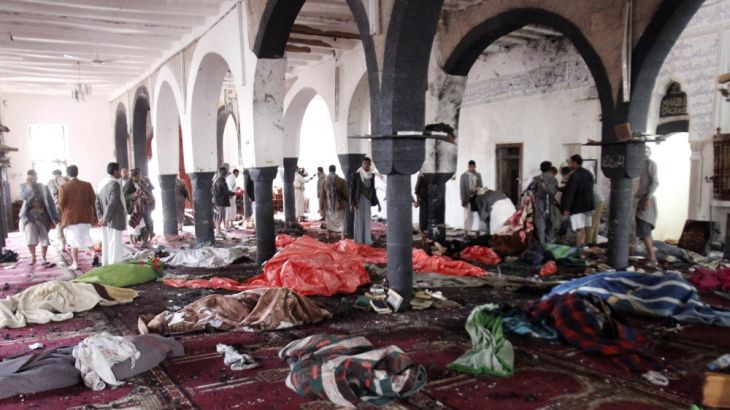UN chief condemns deadly Yemen suicide attacks
Ban urges “maximum restraint” after attacks on two Sanaa mosques used by Houthis killed 137 lives and injured 345 more.

Ban Ki-moon, the UN secretary-general, has condemned the attack on two mosques in Yemen’s capital, urging all sides to “immediately cease all hostile actions and exercise maximum restraint”.
Suicide bombers attacked the Badr and al-Hashoosh mosques used by Shia Houthis in Sanaa during the rush for Friday prayers, killing 137 people and injuring 345 others.
Keep reading
list of 4 itemsUS sanctions shipping firm accused of links to Iran, Yemen’s Houthis
Vessel struck in Red Sea as Houthis promise attacks on more shipping lanes
What we know about deadly Houthi attack on cargo ship
“All sides must abide by their stated commitments to resolve differences by peaceful means,” Ban said on Friday.
The White House also condemned the attack.
Suicide bombs at #Yemen mosques kill ~130 people. Situation in country continues to be dire; urgency on political talks as vital as ever.
— Samantha Power (@AmbPower44) March 20, 2015
“We deplore the brutality of the terrorists who perpetrated today’s unprovoked attack on Yemeni citizens, who were peacefully engaged in Friday prayers,” Josh Earnest, a White House spokesperson, said on Friday.
The Islamic State of Iraq and the Levant (ISIL) group claimed responsibility for the attacks on Twitter. It threatened that these attacks were “only a part of the coming flood”.
RELATED: Yemen at the breaking point
Earnest said the US is still investigating the claim of responsibility by the Yemeni branch of ISIL. He said
the US is looking to see whether ISIL has a command-and-control structure that would enable it to coordinate the attack.
But Earnest also said ISIL often claims responsibility for attacks purely for propaganda value.
Among the dead in Friday’s suicide attacks was al-Murtada bin Zayd al-Muhatwari, a mosque imam and leading Houthi religious leader, a medical source said.
Taha al-Mutawakkil and Khalid Madani, two senior Houthi leaders, were also seriously wounded.
Mohamed Qubaty, a Yemeni political analyst, blamed Ali Abdullah Saleh, the former Yemeni president, and his supporters for the attacks and the instability plaguing the country.
“What we have seen today is a plot to widen the schism between the Sunnis and Zaydis,” Qubaty said.
The Houthis belong to the Shia Zaydi sect, whose followers make up about 30 percent of Yemen’s population.
RELATED: The rise of the Houthis
In another development, a suicide bomber blew himself up at a government compund in the Houthi stronghold of Saada province.
The Houthis, who are accused of being allies Saleh, descended from their heartland in northern Saada last year, fighting their way towards Sanaa and defeating tribal and military rivals along the way.
In September, they flooded Sanaa and raided major state institutions and military bases.
Earlier this year, they put Abd-Rabbu Mansour Hadi, the elected president, under house arrest, disbanded parliament and appointed Mohammed Ali al-Houthi, a cousin of the group’s leader Abdel-Malik al-Houthi, as the new president.
Hadi has since fled to Aden and maintains he is the legitimate president.
In another development, sources told Al Jazeera that an al-Qaeda linked group stormed the local administration compound in Lahij in Yemen late on Friday, killing 21 soldiers.
Local officials and residents said the fighters were driven out of the town by the army.
![A second suicide bomber at the Badr mosque detonated his explosives when panicked worshippers tried to flee [Reuters]](/wp-content/uploads/2015/03/33006c56bc98407da1b29d08c30d207c_18.jpeg)